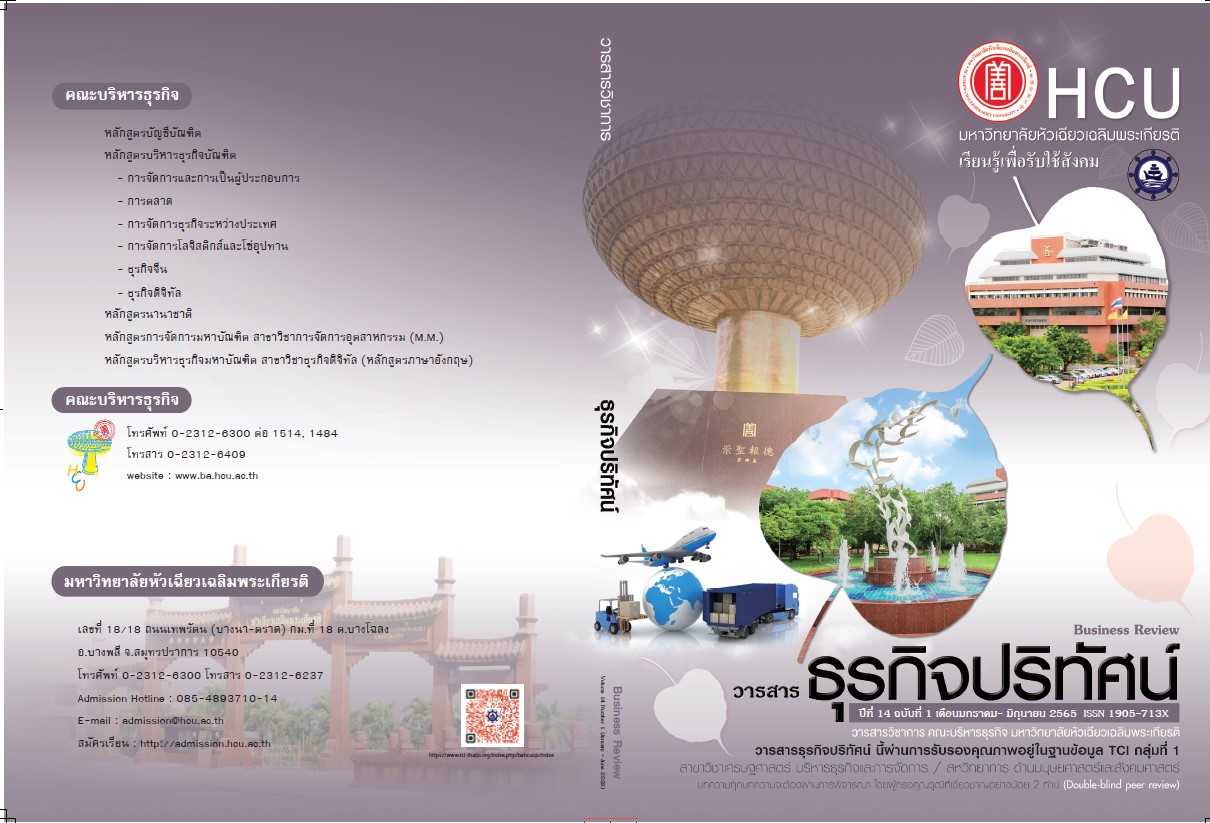The Influence of Workplace Spirituality, Work Values, and Organizational Commitment on Organizational Citizenship Behaviors of Operational Employees in a Steel Pipes Manufacturing Company
Keywords:
workplace spirituality, work values, organizational commitment, organizational citizenship behaviorsAbstract
The aims of this research were to study the effect of workplace spirituality, work values, and organizational commitment on organizational citizenship behaviors of operational employees in a steel pipes manufacturing company. The research method of this study was a mixed method combining quantitative and qualitative method. For the quantitative research method, data was collected from 185 staff. This research tools were workplace spirituality questionnaire, work values questionnaire, organizational commitment questionnaire, and organizational citizenship behaviors questionnaire. The descriptive and analytical statistics were percentage, mean, standard deviation and multiple regression analysis with stepwise method. For the qualitative research method, in-depth interviews with 6 staff were used to explain the quantitative findings. The results indicated that work values of intellectual stimulation, work values of variety, work values of aesthetic, workplace spirituality of strong sense of purpose, and affective commitment could jointly predict 51.8 % of organizational citizenship behaviors of operational employees in a steel pipes manufacturing company (R2adj = .518) with statistically significant level at .001 (p = .000).
References
ชนิกานต์ เสียงเย็น. (2557). ภาวะผู้นำแบบผู้รับใช้ ความพึงพอใจในงาน จิตวิญญาณในการทำงานและพฤติกรรมการเป็นสมาชิกที่ดีขององค์การของหัวหน้างานในธุรกิจบัตรเครดิตและสินเชื่อ. ปริญญานิพนธ์วิทยาศาสตรมหาบัณฑิต, มหาวิทยาลัยเกษตรศาสตร์.
ณัฏฐพันธ์ เขจรนันทน์. (2551). พฤติกรรมองค์การ. กรุงเทพมหานคร: ซีเอ็ดยูเคชั่น.
ธนากรณ์ ใจสมานมิตร. (2563). วิถีการทำงานร่วมกันอย่างมีสุนทรียภาพ. สืบค้นเมื่อ 29 กุมภาพันธ์ 2563, จาก Jobpub.com เว็บไซต์: https://www.jobpub.com/articles/showarticle.asp?id=2750
ธรรมรัตน์ อยู่พรต. (2556). ค่านิยมในการทำงานที่ส่งผลต่อพฤติกรรมการเป็นสมาชิกที่ดีขององค์การของเจนเนอเรชั่นต่างๆ. วารสารบริหารธุรกิจ, 36(138), 40-62.
บริษัท แปซิฟิกไพพ์ จำกัด (มหาชน). (2560). แบบแสดงรายการข้อมูลประจำปี 2559 (แบบ 56-1). สืบค้นเมื่อ 29 มีนาคม 2564, จาก บริษัท แปซิฟิกไพพ์ จำกัด (มหาชน) เว็บไซต์: https://www.pacificpipe.co.th/files/publications/59-3[th].pdf
มณฑล สรไกรกิติกูล และสุนันทา เสียงไทย. (2556). มิติทางจิตวิญญาณในการทำงาน (Workplace Spirituality): ความท้าทายในการบริหารทรัพยากรมนุษย์. วารสาร มฉก.วิชาการ, 16(32), 129-140.
มนัชยา จันทเขต. (2551). ค่านิยมในการทำงาน ความผูกพันต่อองค์การ ความเชื่ออำนาจในตน กับพฤติกรรมการเป็นสมาชิกที่ดีขององค์การของพนักงานการไฟฟ้าส่วนภูมิภาค (สำนักงานใหญ่). ปริญญานิพนธ์ วิทยาศาสตรมหาบัณฑิต, มหาวิทยาลัยเกษตรศาสตร์.
ลักษ์พนมวรรณ บูรพา. (2557). พฤติกรรมการเป็นสมาชิกที่ดีขององค์กรของพนักงานเจเนอเรชั่นวายในกลุ่มธุรกิจโทรคมนาคมในนครหลวงเวียงจันทน์ สาธารณรัฐประชาธิปไตยประชาชนลาว. ปริญญานิพนธ์บริหารธุรกิจมหาบัณฑิต, มหาวิทยาลัยนเรศวร.
วิภาส ทองสุทธิ์. (2552). พฤติกรรมองค์การ. กรุงเทพมหานคร: อินทภาษ.
ศูนย์ข้อมูลเชิงลึกอุตสาหกรรมเหล็กไทย. (2563). รายชื่อผู้ประกอบการผลิตท่อเหล็กเหนียวในประเทศไทย. สืบค้นเมื่อ 6 กุมภาพันธ์ 2563, จาก ศูนย์ข้อมูลเชิงลึกอุตสาหกรรมเหล็กไทย เว็บไซต์: https://iiu.isit.or.th/th/directory/category.aspx?Group=1&Category=83
สไบทอง ชัยประภา. (2545). ค่านิยมในการทำงาน แรงจูงใจใฝ่สัมฤทธิ์ และพฤติกรรมการทำงานของหัวหน้างานในธุรกิจอุตสาหกรรมสิ่งทอที่เข้าร่วมโครงการพัฒนาผู้ประกอบการธุรกิจอุตสาหกรรมในเขตจังหวัดสมุทรสาคร. ปริญญานิพนธ์วิทยาศาสตรมหาบัณฑิต, มหาวิทยาลัยเกษตรศาสตร์.
สิริอร วิชชาวุธ. (2549). จิตวิทยาอุตสาหกรรมและองค์การเบื้องต้น. กรุงเทพมหานคร: มหาวิทยาลัยธรรมศาสตร์.
สุชาติ ประสิทธิ์รัฐสินธุ์. (2540). เทคนิคการวิเคราะห์ตัวแปรหลายตัวสำหรับการวิจัยทางสังคมศาสตร์และพฤติกรรม: หลักการวิธีการประยุกต์ (พิมพ์ครั้งที่ 4). กรุงเทพมหานคร: โรงพิมพ์เลี่ยงเชี่ยง.
สุพานี สฤษฎ์วานิช. (2552). พฤติกรรมองค์การสมัยใหม่ แนวคิดและทฤษฎี (พิมพ์ครั้งที่ 3). กรุงเทพมหานคร: โรงพิมพ์มหาวิทยาลัยธรรมศาสตร์.
Ababneh, K. I., & Hackett, R. D. (2018). The direct and indirect impacts of job characteristics on faculty organizational citizenship behavior in the United Arab Emirates (UAE). Higher Education, 77(2), 19-36.
Ahmadi, S., Nami, Y., & Barvarz R. (2014). The relationship between spirituality in the workplace and organizational citizenship behavior. Procedia - Social and Behavioral Sciences, 114, 262-264.
Allen, N. J., & Meyer, J. P. (1990). The measurement and antecedents of affective, continuance and normative commitment to the organization. Journal of Occupational Psychology, 63, 1-18.
Amah, O. E. (2017). Organizational citizenship behavior across cultures: are organizational citizenship behavior scales transferable across cultures?. Research Journal of Business Management, 11(2), 56-66.
Anvari, R., Barzaki, A. S.,Amiri, l.,Irum, S., & Shapourabadi, S. (2017). The mediating effect of organizational citizenship behavior on the relationship between workplace spirituality and intention to leave. Intangible Capital, 13(3), 615-639.
Arsenich, V. A. (2018). The relationship between workplace wpirituality and organizational citizenship behavior among receptionists (GPRs). Doctor of Philosophy Thesis, Capella University.
Cho, Y. B., & Ha, T. Y. (2016). A study on effect of workplace spirituality of community enterprise on organizational citizenship behavior: mediating effects of job satisfaction. Management and Information Systems Review, 35(2), 137-165.
Garcia-Zamor, J. (2003). Workplace spirituality and organizational performance. Public Administration Review, 63(3), 355-363.
Guven, B. (2018). The quantitative and qualitative analysis of organizational citizenship behavior. Journal of Business & Economic Policy, 5(3), 54-66.
Haghighi, F. B., & Maleki, Z. V. (2016). The relationship between transformational leadership style and behavior of organizational citizen (case study: Ghavamin Bank). International Journal of Learning and Development, 6(3), 80-91.
Ibrahim, M. A., & Aslinda, A. (2013). Relationship between organizational commitment and organizational citizenship behavior (OCB) at government-owned corporation companies. Journal of Public Administration and Governance, 3(3), 35-42.
Khaskheli, A., Jiang, Y., Raza,S. A., Qureshi, M. A., Khan, K. A., & Salam, J. (2020). Do CSR activities increase organizational citizenship behavior among employees? Mediating role of affective commitment and job satisfaction. Corporate Social Responsibility and Environmental Management, 27(6), 1-15.
Kim, Y. J., Hunsaker, W. D. (2018). The effect of workplace spirituality on organizational citizenship behavior: the mediating effect of job engagement. The International Journal of Humanities & Social Studies, 6(2), 67-74.
Kinjerski, V., & Skrypnek, B. J. (2006). A human ecological model of spirit at work. Journal of Management Spirituality & Religion, 3(3), 231-241.
Kumari, P., & Thapliyal, S. (2017). Studying the impact of organizational citizenship behavior on organizational effectiveness. Human Resource Management, 4(1), 9-21.
Lee, Y. H., Woo, B., & Kim, Y. (2017). Transformational leadership and organizational citizenship behavior: Mediating role of affective commitment. International Journal of Sports Science & Coaching, 0(0), 1-10.
Leephaijaroen, S. (2016). Effects of the big-five personality traits and organizational commitments on organizational citizenship behavior of support staff at Ubon Ratchathani Rajabhat University Thailand. Kasetsart Journal of Social Sciences, 37(2), 1-8.
Liang, Y. W. (2012). The relationships among work values, burnout, and organizational citizenship behaviors: a study from hotel front-line service employees in Taiwan. International Journal of Contemporary Hospitality Management, 24(2), 251-268.
Maric, M., Hernaus, T., Vujcic, M. T., & Cerne M. (2019). Job characteristics and organizational citizenship behavior: a multisource study on the role of work engagement. Drustvena Istrazivanja, 28(1), 25-45.
Mat Ali, N. A., Panatik, S. A., & Zainal Badri, S. K. (2020). Impact of work values in promoting organizational citizenship behavior among academicians: the mediating roles of job satisfaction. Social Sciences & Humanities, 28(1), 617-632.
Meyer, J. P., & Allen, N. J. (1991). A three-component conceptualization of organizational commitment. Human Resource Management Review, 1(1), 61-89.
Mohd Yusoff, M. A., Abdul Razak, M. R., Abu Said, A. M., Mohd Noor, M. N., & Yusof, A. (2017).
Organizational citizenship behavior in manufacturing organizations: the influence of commitment, leadership, and teamwork on altruism. Science International (Lahore), 29(1), 315-319.
Nunnally, J. C., & Bernstein, I. H. (1994). Psychometric theory (3rd ed.). New York: McGraw-Hill.
Ojebola, O. O., Osibanjo, A. O., Adeniji, A. A., Salau, O. P., & Falola, H. O. (2020). Organizational citizenship behavior and its influence on manufacturing firms survival in Nigeria: a systematic review. Academy of Strategic Management Journal, 19(1), 1-14.
Organ, D. W. (1997). Organizational citizenship behavior: it's construct clean-up time. Human Performance, 10(2), 85-97.
Organ, D. W., & Bateman, T. S. (1991). Organizational Behavior (4th ed.). Boston: Irwin.
Robbins, S. P., & Judge, T. A. (2007). Organizational Behavior (12nd ed.). New Jersey: Pearson Education.
_______. (2013). Organizational Behavior (15th ed.). New Jersey: Pearson Education.
_______. (2017). Organizational Behavior (17th ed.). Essex: Pearson Education.
Sastrawijaya, A., Retnowati, R., Hardhienata, S., & Arifin, M. Z. (2019). Sequential exploratory organization analysis citizenship behavior, PAUD teacher in Cirebon City. Opcion, 35(22), 2899-2921.
Srour, C. K., Kheir-El-Din, A., & Samir, Y. M. (2020). The effect of green transformational leadership on organizational citizenship behavior in Egypt. Academic Journal of Interdisciplinary Studies, 9(5), 1-16.
Steers, R. M. (1977). Antecedents and outcomes of organizational commitment. Administrative Science Quarterly, 22(1), 46-56.
Tharikh, S. M., Ying, C. Y., Saad, Z. M., & Sukumaran, K. (2016). Managing job attitudes: the roles of job satisfaction and organizational commitment on organizational citizenship behaviors. Procedia Economics and Finance, 35, 604-611.
Zytowski, D. G. (1994). A super contribution to vocational theory: work values. The Career Development Quartery, 43(1), 25-31.
Downloads
Published
How to Cite
Issue
Section
License
Copyright (c) 2022 Business Review Journal

This work is licensed under a Creative Commons Attribution-NonCommercial-NoDerivatives 4.0 International License.
All articles published in the Business Administration and Management Journal Review are copyrighted by the journal.
The views and opinions expressed in each article are solely those of the individual authors and do not represent those of Huachiew Chalermprakiet University or any other faculty members. Each author is fully responsible for the content of their own article. Any errors or issues found are the sole responsibility of the respective author.




